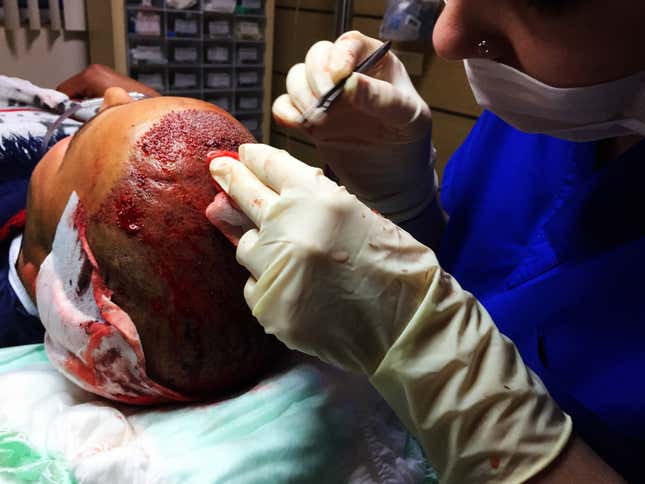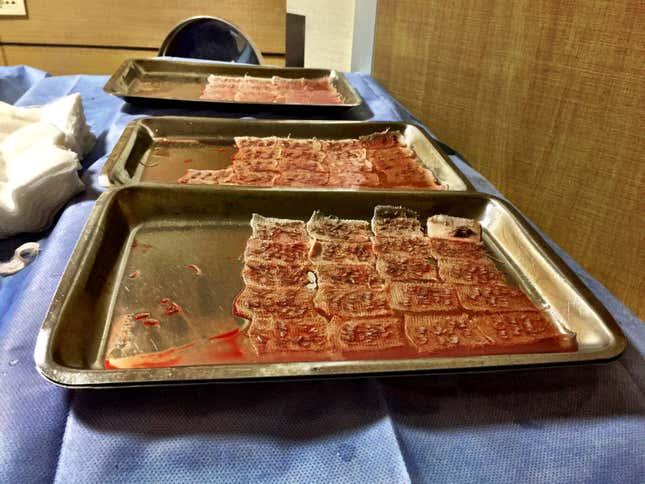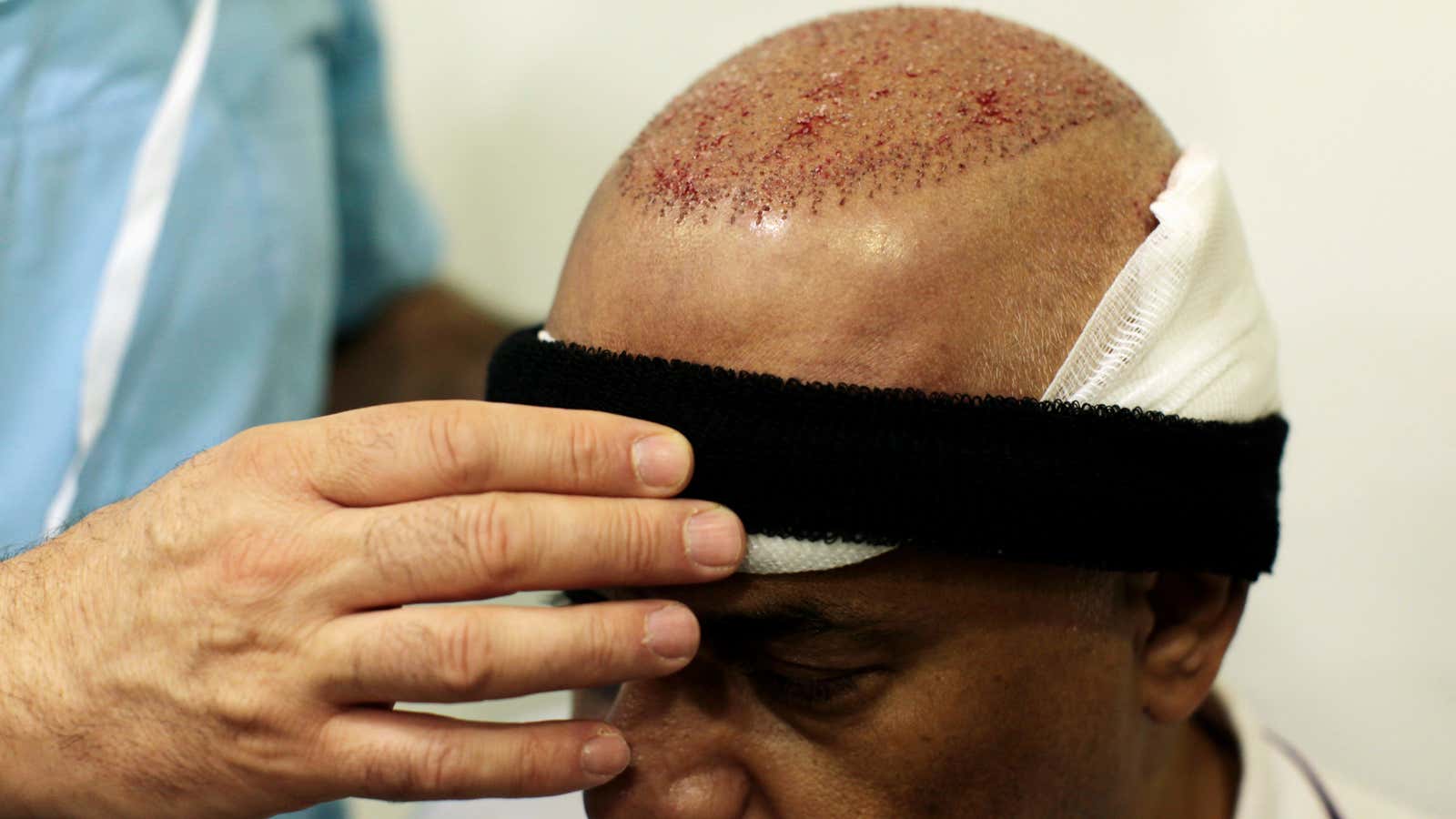Walk through Taksim Square, the center of modern Istanbul, and you’ll see them: groups of men wandering around with their heads swaddled in bandages or bright-red marks shaped like boomerangs stretching from temple to temple at the crowns of their heads.
They’re a sign of one of Turkey’s fastest-growing industries. In the last few years, despite a significant decline in tourism more broadly, the country has become a destination for medical tourists seeking hair-transplant operations. Emin Çakmak, head of the development council of health tourism of Turkey, told the Turkish newspaper Hurriyet that around 750,000 health tourists visited Turkey last year; about 60,000 come for hair transplants every year. Huyesin Kirk, chairman of the Middle East Tourism and Travel Agencies Association, estimates that there are between 150-500 hair transplant surgeries performed every week.
Hair transplants are an exacting and expensive operation where a doctor or technician makes thousands of small incisions at the front of the scalp, then takes hair follicles from the back of the head and inserts them into those incisions in the front. When it works, it results in new hair growth and is one of the only methods to combat baldness. When an operation is botched, the hair will grow in an unnatural direction and there’s a high risk for skin infection and scarring.
Aziz Khellout, a 28-year-old from Algeria, came to Istanbul in 2017 after his hair started falling out about three years ago. On Feb. 23, he sat nervously in a the lobby of a hair clinic, his head swaddled in bandages. He was excited to get his hair back. “Normally I’m self-confident. But since I started losing my hair, my self-confidence went down and down. I just want it back again,” he said. Khellout found the clinic on Facebook; he was impressed by the before-and-after pictures friends had posted. So he flew to Istanbul.

A hair transplant operation in Turkey is not just a medical procedure. Almost every clinic in Istanbul offers a package deal: You get picked up from the airport and brought to your hotel by a private driver supplied by the clinic. Your hotel room will have already been booked by the clinic and you don’t need to worry about transportation on the day of the procedure—the clinic handles that, too.
And people come in droves because while a hair transplant costs up to $25,000 in the US and Europe, in Istanbul, it ranges from just $600 to $2,000.
In part that’s because competition between the city’s clinics is intense. There are now tons of them—“They are springing up like rabbits,” says Talip Tastemel, the general manager of Clinic Expert, one of the biggest hair transplant clinics in Turkey—and many are willing to go to extreme measures to bring down costs to draw in clients looking for a cheap deal. Tastemel says the competition has led clinics hire under-qualified people to perform operations in order to cut costs.
Tastemel admits that even at Clinic Expert, doctors do not perform the majority of operations—despite legal requirements that all hair transplant operations in Turkey be performed by doctors. “After years of work, these nurses and technicians require a minimum level of supervision. But the doctors generally intervene with the complicated cases and complications,” he says.
Most clinics completely disregard the rule. In the past five or six years, the race for clients has outweighed concerns about quality. Tayfun Oguzoglu, a doctor who runs an upscale facility called Advanced Hair Clinic, says it’s common for patients to meet a doctor for a consultation before an operation and be led to believe that the doctor will be performing the surgery—when in fact, it ends up being done by a nurse or technician.

The clinics get away with it, says Oguzoglu, because inspectors from the Health Ministry are more than willing to take bribes in exchange for a warning that an official inspection is coming. “Someone pays the big money,” he says, and when the inspection happens, the clinic makes itself look like its operating fully above board. The Health Ministry did not respond to Quartz’s request for comment.
Cheap hair transplant surgery is one of the only things still bringing visitors to Turkey. In the wake of several terror attacks and a failed military coup, tourism in Turkey declined sharply in 2016. It hasn’t rebounded—except in one sector: hair transplant tourism.
Clinic proprietors say it’s because the majority of their clients hail from Middle Eastern countries—Bugra Ersin Murtezaoglu, the general manager of Natural Hair Turkey, estimates 90% of his clients come from the Middle East. They are, he says, less likely to be spooked about Turkey’s political upheaval than Europeans and North Americans. Indeed, Oguzoglu who markets primarily to Europe and the US, says he was badly affected by both the coup attempt in July and the attack on the popular Reina nightclub on New Year’s that left 39 dead.
There’s a side effect to these unique circumstances: a mini-economy has sprung up within the hair transplant industry for Syrian refugees, who are valuable because they speak Arabic.
Ahmed, a Syrian refugee who asked that we not use any identifying details out of fear of repercussion, has worked in the industry for a year recruiting clients and then shepherding them through the process. He’s the one who answers their late-night calls with questions about the operation and he translates between clients and Turkish staff once they arrive. He says Syrian employees are often exploited by their employers who see them as disposable. “They will have you work 10 hours each day and only give you one day off [per week]” he says. “Still you have the phone and you have to work, so you are not off. If you do not answer the phone, then you will receive a punishment. Maybe they will cut from your salary, maybe they will cut from your off days.”
Mahmoud, who also asked to remain anonymous, is another Syrian refugee and veteran of the Istanbul hair-transplant industry. He has worked at three different companies calling clients and says the intense competition between clinics means that employers are constantly searching for ways to cut costs—often at the price of their employees.
For example, clinics often pay poverty-level base salaries and offer commissions on top of that—but then set unreasonable sales quotas that make it impossible to earn any commissions. “I know one company, where if you don’t reach your quota they will add it onto the next month,” says Mahmoud. “I saw one guy who had a $120,000 quota. He couldn’t leave the job because he has a family, so he is working on the basic salary which is 1,500 Turkish Lira”—about $400 a month.

Mahmoud says the situation is especially difficult for Syrian refugees, many of whom do not have official working permits and therefore no legal recourse if they are treated badly by employers. Because it is difficult for Syrians to find employment in Turkey, he says, many are afraid to leave their jobs despite long work hours and low pay.
Nicholas Grisewood, a specialist in the crisis migration branch of the International Labor Organization (ILO), says many of the issues described by Syrian refugees in the hair transplant industry are common to the many Syrian refugees throughout Turkey. “Refugees are willing to accept conditions that Turkish people are not willing to. They will put themselves at risk for the simple reason of survival,” he explains. While the ILO has not studied the hair transplant industry in particular, Grisewood says they have observed that many refugees are underpaid, work long hours, and do not have work permits.
Emre Eren Korkmaz, a researcher at the International Migration Institute, concurs. “As a consequence of bureaucratic process and conditions to obtain work permits,” he says, “Syrian refugees are generally employed in informal economy which means that they are not registered to the social security system and they cannot enjoy their basic rights and liberties such as freedom of association, health and safety, working hours, minimum wage.”
Both Murtezaoglu and Tastemel vehemently deny Syrian employees are mistreated in any way. “In general in health care you have to answer your phone day and night, this is a general requirement in this domain. This is not because they are Syrian and being abused,” says Tastemel. “To be honest, a lot of refugees and Syrians are making a decent life and salary because of this market. Normally there are not a lot of opportunities for refugees.”
A previous version of this article stated that 1,500 Turkish lira was equal to about $0.25. In fact, it’s equal to about $400.
